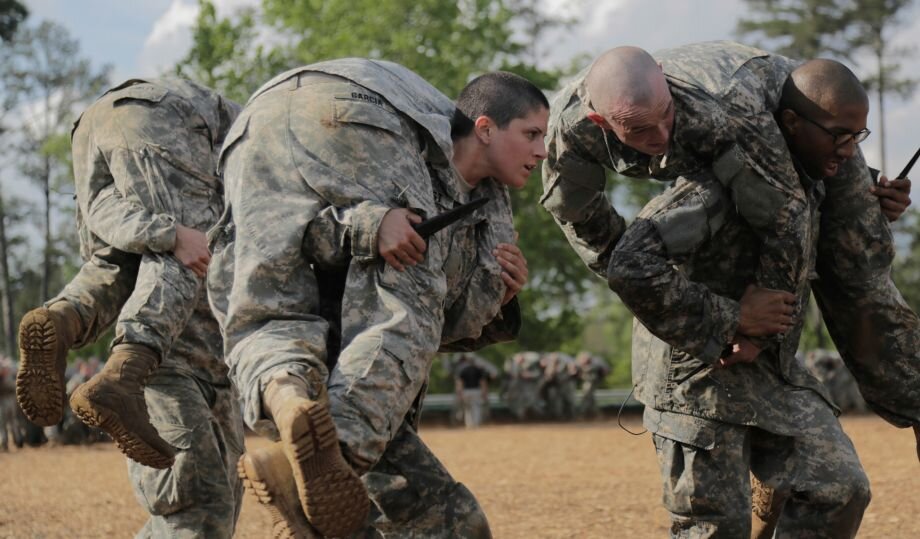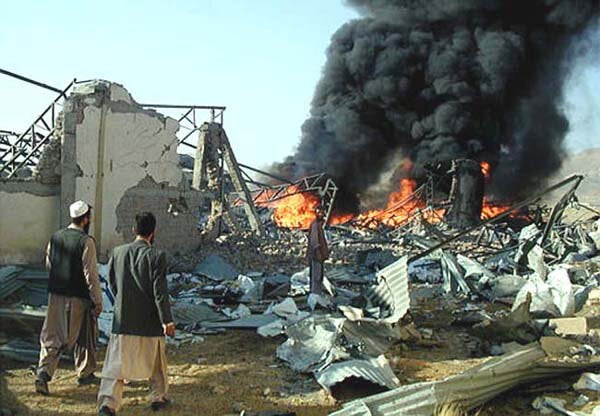
Women in Combat Units is Still a Bad Idea (Sorry)
Just in case you were under a rock the past couple of weeks; two women have graduated from Ranger School. Unsurprisingly perhaps, with this significant event has come a renewed energy regarding the fundamental debate underlying all the praise, scorn, speculation, and sheer noise—women in ground combat jobs.
It is a bad idea.
Not everyone who feels this way speaks out about it. From active-duty, to veterans, to civilians alike, one thing I've heard is the reluctance of many to publicly oppose the idea. This reluctance stems from a fear of being tarred-and-feathered “politically incorrect," a term apparently as morally reprehensible as child molestation these days. However, we here at Operator as Fuck aren't interested in toeing any lines.
This isn't a smear piece, nor is it rabble-rousing. The reason for this article is very simple; to clearly categorize some of the different concerns regarding women integrating into combat units, and then elaborate on them to hopefully shed some (still) much-needed light.
To wit:
The lowering of standards, yeah, I know—I'm not interested in whipping a dead horse either. Not that this concern isn't an important one, it is. But there is a rather simple solution; if universal standards are mandated and enforced there really isn't much more to discuss. Moreover, I want to use this space to address concerns that are not so easily remedied.
Degeneration of the combat community structure; this is the big worry, right? So, with that in mind, lets suppose that women are granted full entry and that the requirements for men and women are exactly the same. Lets also suppose nobody tampers with the vetting process: meaning no overseeing, Yes Men generals pushing women through, as well as no misogynistic gate-keeper putting an extra sandbag in a girls’ ruck prior to some training evolution. Given enough time, it stands to reason, that the process would result in infantry platoons, recon teams, etc. - with some women in their ranks. It is here where the argument resides; the legitimate concern of how this will ultimately effect a combat unit’s ability to carry out it's mission.
Let me be clear, I am about to dive into why women should not be in the infantry and special operations communities—but let me be equally clear—this is no degradation of the women, present and future, that want to confront this grueling undertaking. Now maybe this is just a sign of me getting old, jaded, and time to wear one of those black ball caps with all my medals dangling off it . . . but considering the women who would presently strive for combat occupations are Millennials, and the average female of that ilk can’t go without their daily Instagram update; popping anti-depressants for the latest calamity, and Adderall for their next exam . . . if a young lady from that wants to shit in a wag bag next to a huddle of men, carry a M240G for 15 grid squares without so much as a Tweet . . . then right the fuck on, they absolutely have my respect.
I will even go as far as to say women should be allowed to attend any and every school in our military. For personal accomplishment, promotability, or familiarization with cousin-communities and occupations that can help her perform her job all the better—yes, I am a card carrying member of this idea-club.
But past this, here is where I get off the train. Nothing will change biology, human nature, or the life-or-death importance of a combat unit’s framework.
Some things to consider. . .
For some odd reason, the anatomical argument receives the least traction (maybe because it’s irrefutable statistics, therefore a buzzkill to the debate). So, I will play the game and abide, and get the anatomical stuff out of the way. It is truly the tip of an iceberg called the Musculoskeletal Injuries in Military Women , but consider these stats: the astronomical difference in reported pelvic stress fractures in male and female recruits (1 per 367 females, compared to 1 per 40,000 males), ACL ruptures in athletes (females range from 2.4 to 9.7 times higher), or trainees discharged from Basic Combat Training for medical reasons (12.7% females, compared with only 5.2% for males). These are only a few of the many findings that should obviously be considered.
Next there is a controversial argument, one at the epicenter of what combat units actually do, and what combat actually is.
About a week ago, we posted on our Facebook page a quick blurb explaining that women already occupy various roles in Tier 1 outfits and high-clearance three letter agencies. It is true. Women possess the critical thinking ability, no contest. Have women passed grueling vetting courses? Absolutely. Are women capable of killing—oooooh, fuck yes.
“Women have almost always fought side by side with men in guerilla or revolutionary wars, and there isn’t any evidence they are significantly worse at killing people…" - Gwynne Dyer
But there is an important distinction that must be realized. The difference between, say, a CIA operative and a grunt platoon is, what I like to call, the ant colony/007 disparity. Where the CIA operative works semi-autonomously, and within a spectrum of intelligence gathering to specialized direct action capabilities, the grunt platoon—as is the case for all genuine combat units in the US military—is a rigid and complex structure of hierarchical obedience. This structure, both creates and depends on order and discipline to operate in the most chaotic maelstrom one can possibly endure. And I think this is where most people turn a blind-eye: scenes such as your One Man getting his jaw shot off, and having to push his stunned body through the fatal funnel to neutralize the threat is done so by an acquired socio-psychological discipline. Said discipline is as supported by rigorous order as it is pumped to the gills with hormones.
Marine Captain, Lauren Serrano touches on this beautifully:
“The average infantryman is in his late teens or early twenties. At that age, men are raging with hormones and are easily distracted by women and sex. Infantry leaders feed on the testosterone and masculinity of young men to increase morale and motivation and encourage the warrior ethos.”
People are absolutely neglecting the human sexuality component in a rather important long-term national security issue. The all too human factors of sexual jealously, men’s general protective nature over women, favoritism, and a Pandora’s box of emotions that have no place in a stack about to clear a hot room, have been nothing short of dismissed; and those who dare mention it are immediately labeled archaic. Instead of facing this reality, the most ardent advocates for full integration usually fall back on the paper tiger of clichés; stating that the members of a “co-ed fighting unit" will miraculously hold (or should hold: cue wag of the finger) some bumper-sticker slogan of unity and teamwork in such impervious, high-regard that it will somehow negate the very sex drive that insured humankind's survival of the ice age and the bubonic plague.
Moving on. . .
Capt. Kristen Griest and 1st Lt. Shaye Haver, are exceptional women for graduating Ranger School, no question about it. But the irony is this popular applause contains the Achilles heel to the very argument for integrating women into combat occupations—most women, in fact, are not going to be “exceptional," by the very definition of the word.
Now this isn't an issue if the conversation was only about how many tough women can volunteer, attend, and complete elite schools. But this isn’t the conversation. This landmark graduation is without question providing some momentum toward the looming full integration of women into combat units. If full integration occurs, this will almost certainly result in a revision of our current Selective Service procedures.
Army lieutenant colonel (ret.) Robert Macginnis illuminates future proceedings in his own comprehensive investigation:
“Lifting all combat exclusions for women virtually guarantees that the Supreme Court will declare male-only conscription unconstitutional. And a return to the draft is far more likely than most people realize. The unsustainably high cost of the all-volunteer force, especially with $17 trillion in national debt, and expected requirements of future military operations will probably lead to a resumption of the draft, however politically unpopular it might be. When that happens, women will be drafted and forced into ground combat roles."
Stop and read that quote again. Is this honestly fair to women, if objective medical evidence continues to suggest the average woman can’t perform in an overall infantry-centric capacity without accruing substantial and lifelong injuries? Is this fair to the tax-payers who will be forced to foot the bill for the rightfully-granted medical retirements and disability compensations? And is the recent graduation of TWO exceptional women from Ranger School even remotely grounds to further this cause?
*****
To those who will scramble and say "other countries have women in combat roles," to that I answer; Israel isn't as integrated as most think, and they're also the size of New Jersey, in a permanent defense posture; months rotting in jungles or extended campaigns in foreign countries is exempt from their playbook. Also, the operational intensity of the US military is not paralleled by Romania or Sweden, and their mixed-gender numbers are so incredibly small that, according to the UK's Ministry of Defense (who do not allow women in direct combat roles):
"...the numbers are very small, and therefore, where research is feasible the small sample sizes would call into question the viability of statistically significant measurements in relation to cohesion and the impact on operational effectiveness."
The history of ground conflicts the US has been involved in in the past 100, or 50, or even 15 years registers off the charts in comparison to most other nation's militaries, who generally are providing aid and man-power as UN sanctions and international relations dictate. Lets also face it, regardless of how you feel about it politically, the USA will be involved in low-intensity conflicts against terror organizations until the end of time... and likely any large scale wars the future may hold.
To those who cry out with good intentions, "women have just as much a right to serve their country as men do!" You are correct. But service is exactly that. Serving to achieve overall success is priority, and women have served excellently as support and attachments in vital roles, particularly in gender-sensitive regions like the Middle East. This is not marginalizing women, they are not being shunted to the unglorious support roles so the men can hog the spot light; this is an objective view of how to be the most efficient in a combat zone.
And that brings me to a final potential criticism, "women have already been directly serving in combat because traditional front lines didn't exist in OIF and OEF." No. They. Didn't. . . Because.Yes.They.Were. Going from 8 days of snap vehicle check points, cordon knocks, hard hits and patrols to return to an utter fortress where ice cream was available. . . there couldn't have been a clearer distinction.
In truth, war is sometimes fun, but it is never fair. The goal is to win, and I don’t care what pandering politicians say—winning is not defined by nation-building or making people happy; that isn’t the militaries job. Winning is killing the enemy while preserving the lives of our own. The mechanisms to ensure this goal should be the highest priority of the military, and ideally the civilian population it serves—it appears that it isn't, at least not right now.
—Mr. Blonde
Written By David Rose (AKA Mr. Blonde)
August 24, 2015









